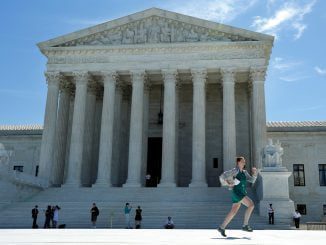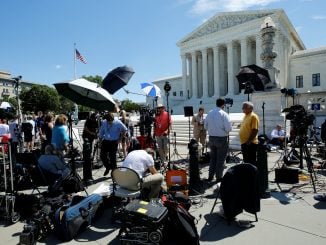RALEIGH — Republican lawmakers will request a stay from the U.S. Supreme Court on the decision handed down by the 4th Circuit Court of Appeals this week that invalidated the current N.C. Congressional District maps, and by extension, this spring’s congressional primary elections.
Judge Jim Wynn wrote the 2-1 opinion Monday saying that the North Carolina Republicans illegally drew up U.S. congressional districts in the state to benefit their party, suggesting that new lines be crafted before November’s election.
The three-judge panel said in a 321-page opinion that Republican legislators responsible for the map conducted unconstitutional partisan gerrymandering to dilute the impact of Democratic votes.
“That is precisely what the Republican-controlled North Carolina General Assembly sought to do here,” the opinion said.
The panel gave parties until Thursday to file their recommendations to fix the problem.
“Without a stay from the Supreme Court, NC’s electoral system will be thrown into chaos, causing massive voter confusion and no representation from NC at the start of Congressional session,” a statement from Republican leadership read on Tuesday. “Further, the state would be unable to hold elections in time for North Carolina’s Congressional delegation to be seated at the beginning of the 116th Congress.
The decision could have national implications in this November’s battle for control of Congress. Democrats need to pick up 23 seats to gain a majority in the U.S. House of Representatives that could thwart Republican President Donald Trump’s legislative agenda.
Among the suggestions from the judges were holding state nominating primaries in November with new district lines that remove illegal partisan bias and then holding a general election before the new U.S. Congress is seated in January 2019.
“What the court suggests is simply impossible. I’m not aware of any other time in the history of our country that a state’s Congressional delegation could not be seated, and the result would be unmitigated chaos and irreparable voter confusion,” House Speaker Tim Moore (R-Cleveland) and Senate Leader Phil Berger (R-Rockingham) said in a joint statement. “The Supreme Court must step in to correct this disastrous decision.”
The North Carolina dispute centered on a congressional redistricting plan adopted by the Republican-led legislature in 2016 after a court found that Republican lawmakers improperly used race as a factor when redrawing certain U.S. House districts after the 2010 census.
North Carolina Democratic Party Chairman Wayne Goodwin said the decision “is a monumental and necessary line in the sand stating that politicians cannot choose their voters by silencing other voters.”
Republicans in 2016 won 10 of the 13 House districts — 77 percent of them — despite getting just 53 percent of the statewide vote, nearly the same result as in 2014.
In June, the U.S. Supreme Court threw out a lower court ruling that Republicans drew the boundaries to ensure electoral victories for their party.
But the justices sent the case back to the federal three-judge panel to reconsider whether the plaintiffs, including a group of Democratic voters, had the necessary legal standing to sue in the case.
According to an affidavit by Kim Strach, Executive Director of the North Carolina State Board of Election, the earliest a new election could be scheduled under the normal procedure would be after the November, 2018 election.
“The outcome of the federal court canceling North Carolina congressional elections would be denying North Carolinians their right to vote and denying them any representation in Congress when it meets next year,” lawmakers wrote.



